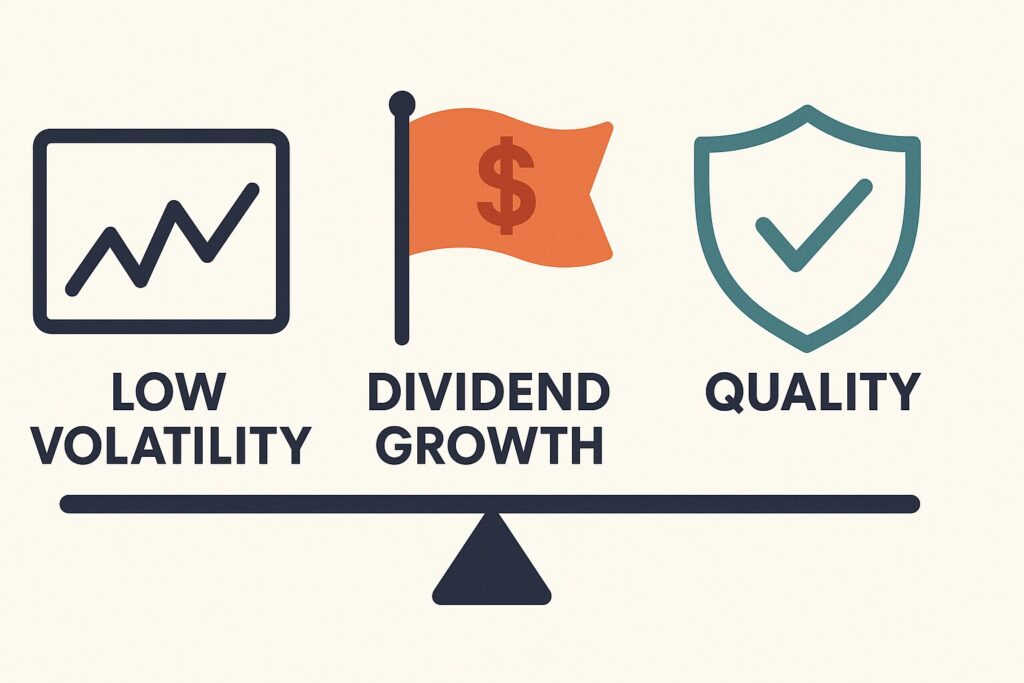
Why low-volatility, dividend growth, and quality matter more than ever in your golden years.
If you’re retired—or close to it—you already know that your investing goals have shifted. You’re no longer trying to “beat the market.” You’re trying to protect what you’ve built, generate steady income, and grow your savings just enough to outpace inflation.
But how do you strike that delicate balance between safety and growth?
The answer: Focus on the three most important investing factors for retirement success—low-volatility, dividend growth, and quality. These three principles can help you build a portfolio that grows steadily, pays you regularly, and shields you from the worst market shocks.
Let’s take a closer look.
✅ 1. Low Volatility: The Foundation of Peace of Mind
Low-volatility stocks aren’t flashy—but they are predictable. These are companies with stable stock prices that don’t swing wildly during market chaos.
Why it matters for retirees:
- You avoid the emotional roller coaster that leads to poor decisions
- You reduce the chances of needing to sell during a market dip
- You get smoother, more reliable performance over time
In fact, studies have shown that low-volatility portfolios often match or outperform the broader market over long periods—with far less risk.
📌 Try this: Consider ETFs like USMV or SPLV, which filter for the least volatile U.S. stocks.
✅ 2. Dividend Growth: The Paycheck That Gets Bigger
Dividend-paying stocks are a retiree favorite—but don’t just chase yield. Instead, focus on dividend growth.
These are companies that raise their dividends year after year, providing:
- A hedge against inflation
- A growing income stream to support your retirement
- A signal of financial strength and management discipline
Over time, dividend growth stocks offer both income and capital appreciation, making them ideal for retirees who want to live off their portfolio without draining it.
📌 Try this: Look into Dividend Aristocrat ETFs like NOBL or individual stocks like Johnson & Johnson (JNJ) and PepsiCo (PEP).
✅ 3. Quality: The Quiet Giant of Retirement Investing
Quality stocks are those with strong balance sheets, consistent earnings, and high return on equity. These companies weather economic storms, avoid debt disasters, and tend to bounce back faster when markets drop.
For retirees, quality matters because:
- These companies are less likely to cut dividends
- They tend to outperform in downturns
- They give you confidence that your money is in good hands
📌 Try this: Look at ETFs like QUAL (iShares MSCI USA Quality Factor ETF), or combine quality with dividend growth through DGRO or VIG.
🧓 Real-Life Example: George’s Retirement Growth Plan
George, a 68-year-old retiree, wanted to protect his $600,000 nest egg while generating monthly income. He divided his portfolio into:
- 40% low-volatility ETFs like LGLV
- 30% dividend growth stocks and ETFs like NOBL and PG
- 30% high-quality stocks and funds like QUAL
The result? A portfolio that grows steadily, pays him reliable income, and stays calm when the markets aren’t.That’s exactly what George wanted—and what every retiree deserves.
✅ The Bottom Line
In retirement, growth still matters—but safe growth matters more.
Focusing on:
- Low-volatility stocks to reduce portfolio swings
- Dividend growers to build rising income
- High-quality companies to anchor your wealth
…can give you the steady returns, income reliability, and confidence to enjoy the retirement you’ve earned.
It’s not about chasing the next hot stock. It’s about building a portfolio you can live with—and live off—safely.
⚠️ Disclaimer
This content is for educational and informational purposes only and should not be considered financial, investment, or tax advice. Investing involves risk, including the possible loss of principal. Always consult with a qualified financial advisor before making investment decisions. The author is not a licensed investment professional and does not offer personalized investment advice.